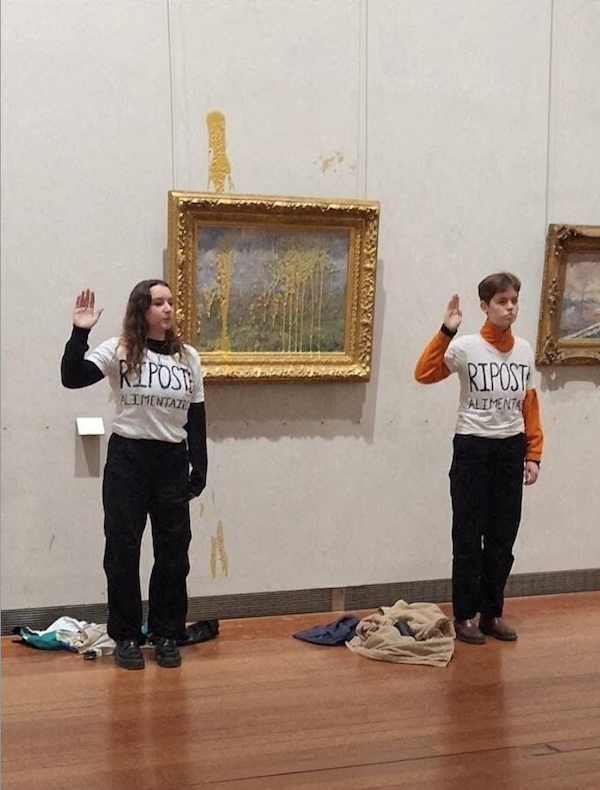At 3.30pm on Saturday February 10, Claude Monet‘s painting Spring was the object of an act of vandalism. Two activists from the Riposte alimentaire group sprayed the glass canvas, painted in 1872, with soup. Immediately after the incident, the room where the painting was on display was evacuated and the national police arrested the two protagonists.
The painting will be inspected and restored. The museum will be filing a complaint for vandalism.
Tomorrow, Sunday February 11, the museum’s Impressionist galleries will be closed to the public.

Iconoclastic barbarism, conceptual impotence, gregarious mimicry: for some time now, all over the world, morons of all stripes have been hogging the limelight by wreaking havoc on works of art. It’s all in the staging. Cell phones and social networks become the vectors for these demonstrations of vandalism, carried out under the most manipulative pretexts. The other is denied, “I’m me” and deal with it! No rationality, absurdity of an attitude that has legitimacy only in the sheer numbers of those who will be informed. The egalitarianism of information that spreads like an ebb over flooded lands, but glaucous and black waters.
Militant men and women (gender equality in all its absurd fullness! ) spray paint, or vegetable soup (for the eco-friendly side, we’d laugh if it weren’t so silly!), this or that work and, of course, like trophies, have their pictures taken in front of their crimes.
Ah the idiots, the morons, if they only knew!
As Lacan would write, brought up to date by an exhibition at the Centre Pompidou-Metz,1conne (women activists committed this act of vandalism at the Musée des Beaux-Arts in Lyon) is written with 2N. Microcosm versus macrocosm.
But far from hatred, it’s stupidity we’re talking about. For what’s the difference between these rifle-wielding meatheads posing like Tartarin behind their furry or feathered game lying on the ground, or these African animals shot like clay pipes in the fairground stalls, and these immature people, discovering the speed of communication and information and its power to influence. There aren’t any, so ecology is just a pretext here!
What could be their only excuse is the young age of these activists, who have just reached puberty.
Not only are we in the throes of a volcano 2, but just as serious are the tipping points which, in irregular cycles, catch up with humanity and propel it forward. When it comes to restoring meaning to a disintegrating society, it’s all about who shouts the loudest, and the most vociferous believes he or she is the best and cares nothing for others. These givers of lessons, in their activist unconsciousness (and I’m holding back my words), are nothing but small-minded fascists! No doubt they couldn’t accept this political categorization, who present themselves as libertarians, progressives, ecologists and revolutionaries, in love with ideals but contemptuous of others. These impotent agitators, on the contrary, give grist for the mill to those on the other side who dream only of blind authority and the muzzling of the rule of law. From both sides of the political spectrum, extremes come together, pretending to ignore each other.
Why this subtitle
Let’s return to the title given to this previous chapter. Admittedly, its semantics belong to the realm of invective and popular, vulgar language. But it also has a very special history in France: the Munich Accords and the return of Édouard Daladier, President of the Council, to the Bourget airport on September 30, 1938, after the shameful Munich Accords with Hitler. Cheered on by the Parisians who had come to welcome him and who believed in peace, he mumbled in his car: “Ah, the idiots, the morons, if they only knew…“. Our era bears a striking resemblance to that pre-war period. The world, in its so-called globalization, is going through a telluric period, with blocks breaking apart and new ones coming together, and that’s where the danger lies. When icebergs break away from the pack ice, the Titanic is not far away. So, on that day in September ’38, Monsieur Daladier had unknowingly, and far more than he thought at the time, shown foresight! What’s even funnier is that, on that day, his astonished declaration, his sudden return to political virtue, went down in history!
Bouvard and Pécuchet3, some would say, there’s no doubt we’re there, and conceptual minimalism is the stuff of social networks.
For these teenage activists, these young girls, may only represent a futile microcosm, but their approach is representative of our mental environment.
Why not me, why not us? For them, it’s first and foremost a question of making themselves known, of appearing, of breaking out of the straitjacket of the banal, of existing in the world, of taking flight, and it doesn’t matter how. Everything is equal to everything… Unfortunately, we know only too well where this can lead!
Furthermore, and we think it’s more than useful to make this clear, we’re not content to be commentators on our times, and we’ll never be content to watch the leprosy of hatred, manipulation and lies advance and circumvent the legitimate concerns of lost men and women with no bearings who make up society, in order to gain access to power.
It’s always interesting to attempt historical shortcuts and look for links. Ideals versus reason, revolutionary fever versus reformism. Rousseau versus Voltaire. These are the old debates of our history, our arts and our literature, and we’re all familiar with their ups and downs!


